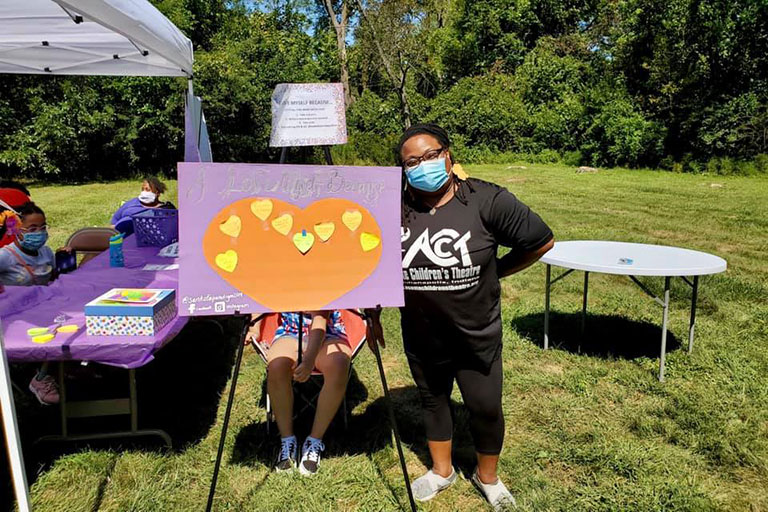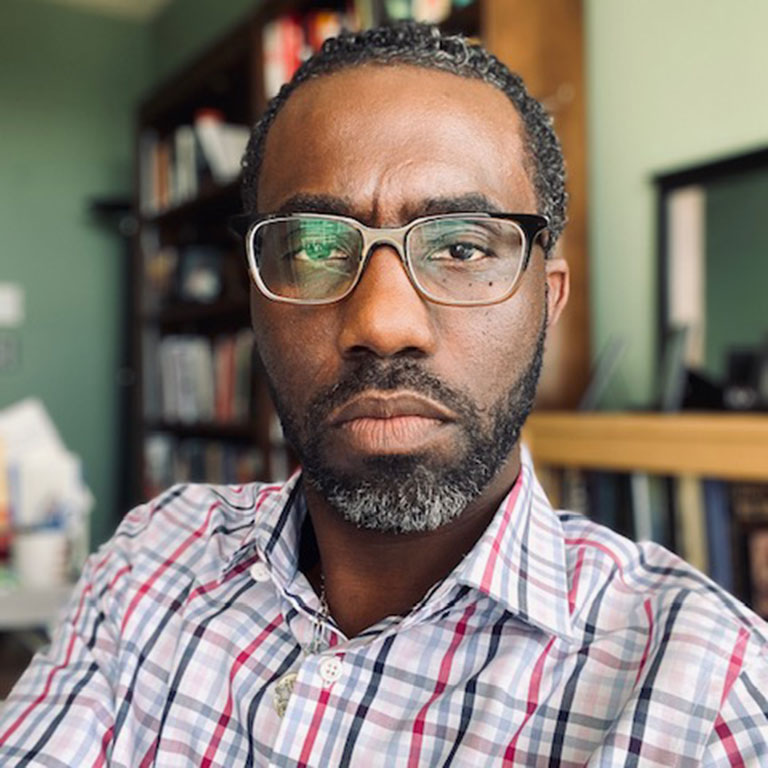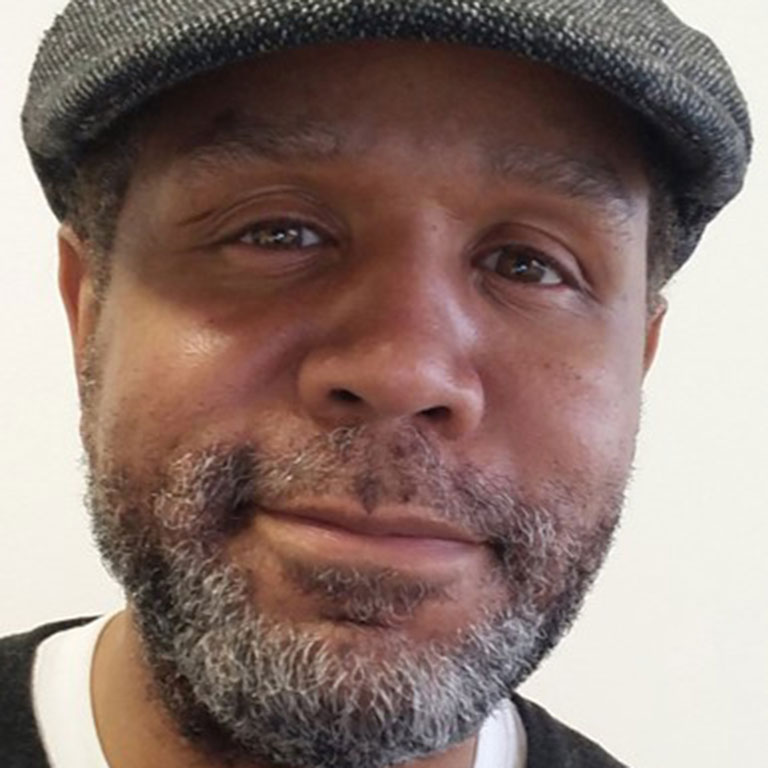October 2020
Black arts and cultural organizations have long been pillars of their local communities, offering a variety of artistic opportunities to families as well as important community support. So when the COVID-19 pandemic hit and social distancing orders were announced, these organizations – and the families who rely on them – were hit especially hard.
IUPUI’s Joseph Lennis Tucker Edmonds and Lasana D. Kazembe are assessing the important contributions of Black arts and cultural institutions in central Indiana and beyond and are working to identify ways to support their ability to survive and thrive during the pandemic.
“We are looking at how community organizations have pivoted to be more nimble and resilient in terms of their cultural products, but also in terms of other services they provide their communities – both of which can be impacted by a loss of funding or lack of access,” said Tucker Edmonds, assistant professor of Africana studies and religious studies in the IU School of Liberal Arts at IUPUI. “Black arts and cultural organizations have always been responsible for the overall well-being of the community, and these additional services become even more important in times of crisis.”
Community members often look to these organizations for a variety of needs. They may provide meals to families or offer homework help or tutorial services to local children. Youth in their programs also benefit from services such as professional readiness and mentorship, and they gain a strong understanding of cultural literacy through their participation.
Tucker Edmonds and Kazembe will shine light on the importance of Black arts and cultural organizations when they launch a digital platform later this year. It will be an online space where organizations can gather information but also share their own stories. They plan to offer free membership profiles and anticipate a site filled with success stories that promote the work of Black arts and cultural organizations.
An important feature of the site will include data Tucker Edmonds and Kazembe will collect through local and nationwide surveys created by IU’s Center for Research on Inclusion & Social Policy. The surveys will allow them to identify models for collaboration, capacity building and long-term sustainability. While data from researchers is often inaccessible in terms of the format or access fee, they plan to offer their findings for free, written in an easily understandable way. Black arts and cultural organizations can use the data to help tell their story and apply for funding.
“Other surveys across the country on the impact of COVID-19 do not ask the questions around culture and race and the other services these organizations offer, because they are focusing on the mainstream services organizations provide and not thinking about the holistic components that often times Black arts and cultural organizations are committed to,” Tucker Edmonds said. “Our goal is to bring that to the front, and hopefully as other groups do surveys and analysis, they will also begin to ask a better set of questions so they can more fully assess the broad diversity of arts and cultural organizations to see what they are doing.”
To gain first-hand knowledge of the pandemic’s true impact on Black arts and cultural institutions, Tucker Edmonds and Kazembe are working with a group of five central Indiana organizations – Asante Children’s Theater, Iibada Dance Company, Kheprw Institute, Freetown Village, and the Indiana Performing Arts Center. They want to provide these groups with an opportunity to share their stories, highlighting their resilience and response to COVID-19 in ways that are meaningful to them.
Description of the video:
[Seated Black woman, wearing glasses, large earrings, necklace, and blue headband, appears on screen, talking]
[Music plays]
[Words KEESHA DIXON, Executive Director of Asante Art Institute of Indianapolis appear at bottom of screen]
I'm Keesha Dixon. I am the executive director of the Asante Art Institute of Indianapolis. We use theater arts, acting, singing, dance and storytelling to teach life skills and build an awareness of global citizenship, and at the same time, we preserve African
[Drawing of a dragon appears on screen; fades to drawing of silhouetted figures in bright colors; fades to drawing of winged figure holding a sword]
and African American performing techniques. We predominantly serve African American individuals and families.
[Keesha Dixon reappears on screen, talking]
COVID, of course, has impacted us more so than other populations. Our artists went through a grieving process because they could not do in-person, and we laid off staff for approximately three weeks, but they had to get back on the saddle because
[Photo of Black woman wearing mask and standing next to poster at an outdoor event appears on screen]
our children were out there. They still have to learn, and they still have to
[Keesha Dixon reappears on screen, talking]
be thinking about how they're going to get through this, because we are going to take them to the other side.
[Seated Black professor wearing glasses appears on screen, talking]
[Words JOSEPH LENNIS TUCKER EDMONDS, Assistant Professor of African Studies and Religious Studies, appear at bottom of screen]
The project is looking at the ways in which Black arts and cultural organizations and institutions in the city of Indianapolis have responded to and have been resilient in the face of the COVID-19 pandemic.
[Photo of people sitting on physically distanced folding chairs in a field, listening, appears on screen]
The project has identified five organizations in central Indiana.
[Joseph Edmonds reappears on screen, talking]
These organizations cover everything from art installations to dance performances to amazing children's theater to historic retellings to even growing gardens in the on the east side of Indianapolis to help recover historical ways of horticulture and cultural practices from the African diaspora. They provide a number of other cultural and social services to the communities that they serve
[Photo appears on screen of two masked individuals, one standing on bed of a pickup truck holding food and another standing on ground holding food.]
from arts to food preparation to
[Joseph Edmonds reappears on screen, talking]
educational services and support to just providing spaces and places for the Black community to come together and share their celebrations and their grievances.
[Second Black professor with a beard, seated, appears on screen]
[Words LASANA D. KAZEMBE, Assistant Professor of Urban Education Studies, appear at bottom of screen]
We were thinking the Fall of '21, creating a portal to act as a ground zero or clearing house for these various organizations that we're working with. We want to be able to aggregate resources, data, all sorts of cultural assets, but also we want to be able to share some of the success stories and some of the strategic efforts that they have utilized over the years that work.
[Joseph Edmonds reappears on screen, talking]
The whole world has been devastated by COVID-19, and we know that while it has devastated the broader population, that poorer communities, Browner communities, Black communities have been disproportionately devastated by this crisis. It has not only negatively impacted the ability for smaller arts and cultural institutions like Asante Art Institute to do its work, but it has also placed a greater degree of pressure on them to do more work. So at the time that COVID-19 has increased its impact on Black and Brown communities, we are also calling on the creativity and the resilience of these cultural organizations to step up and to fill the gaps actually caused by this devastation.
[Photo of promotional poster for a show appears on screen with words DREAM FIRE written over image of people with raised hands around a large fire]
These online plays that organizations like Asante are doing are actually
[Joseph Edmonds reappears on screen, talking]
filling in for the lack of arts in our school systems, are filling in for the fact that summer camps were all canceled this summer, are filling in for the fact that parents need a break during a crisis where jobs have not stopped and people and time has actually increased.
[Photo of two men wearing red T-shirts and face masks, working at an outdoor food bank, appears on screen]
We want to highlight the great work that they're doing
[Joseph Edmonds reappears on screen, talking]
even in the midst of losing resources and having to evolve and change in the midst of this crisis, and we most importantly want to talk about the disproportionate resilience and creativity that around the country, that as these organizations were responding to COVID-19, that they did not cower or turn back away from their organizational mission, but they actually increased their organizational reach.
[Photo of people working outdoors distributing food in a neighborhood appears on screen]
So we want to create, help generate some synergy around that,
[Lasana Kazembe appears on screen, talking]
partnering if you will on events and programming in the future, sharing resources not just during COVID, but also during, you know, post-COVID.
[Photo of field with pumpkins sitting next to raised beds of dirt next to a house appears on screen]
I mean you can't
[Lasana Kazembe reappears on screen, talking]
put a price tag on the amount of service and the amount of contributions that and commitments that we have made, these organizations have made to the artistic landscape, to the educational landscape and of course you cannot put an impact on the number of children and families whose lives have been touched as a result of being in relationship with these
organizations.
[Keesha Dixon appears on screen, talking]
This project is telling stories that people need to know. We don't depend on the schools to share what we're sharing, so we're going to tell the truth about our history.
[Screen fades to black. IU Trident and the words Indiana University and research.impact.iu.edu appear against black screen]
[Screen fades, music stops]
“Black arts and cultural organizations, Latinx organizations and Asian organizations get around two-percent of the funding that is available nationally even before COVID-19, so what was once a bit of a trickle in terms of funding these organizations received has now turned into drips,” said Kazembe, an assistant professor in the IU School of Education at IUPUI. “We want them to build more, do more, build their organizational capacities, and serve their audiences. They contribute so much to the arts and cultural landscape of the city and of central Indiana.”
Tucker Edmonds said they hope that by telling these narratives and sharing the data, funders and other individuals interested in the well-being of Black and Brown communities will understand the obstacles these organizations face, and that they may also be open to funding some of the other services they provide.
During the project, Tucker Edmonds and Kazembe hope to use their expertise in helping Black arts and cultural organizations best serve their communities.
“These organizations often don’t get the benefit of connecting with university researchers in a way that the researchers are sensitive to what they do and how they do it and can assist them with bringing their stories forward,” Kazembe said. “This is a wonderful opportunity for us to be able to use our scholarship insights and expertise to connect it to the work they do, to introduce their work to a new audience, and to really elevate what they do.”
They expect to have their digital platform live by the end of the year for organizations to contribute data and share their stories, and they plan to launch the public-facing section in 2021.




